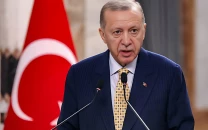US, Pakistan should work towards a 'post-alliance future': Husain Haqqani
ex-Pakistan ambassador to US says army continues to influence Pakistan's domestic politics.

US, Pakistan should work towards a 'post-alliance future': Husain Haqqani
Talking to Radio Free Europe (REF)/Radio Liberty (RL) Haqqani said that both the countries needed to find a common ground to change the basis of their relationship. He added that Pakistan and US needed to have a long-term relationship rather than a transactional 'alliance'. Working on a military-less post-alliance relation will help both countries burgeon trade, people-to-people relations and friendship.
Army continues to influence domestic politics
The former Pakistan ambassador while expressing his respect for the military for their role in protecting and sacrificing for the country in times of war, said that "Pakistan has suffered a lot from the military's political role."
Elaborating, he said that Pakistan military, during its decades of rule, tries to define what is good for the country and what is not. "That job should rest with parliament, with the Pakistani media, with open debate, [and] with civil society."
However, Haqqani noted that while the military has publicly moved away from mainstream politics, it was still a critical actor having a great deal of sway.
"I think that Pakistan's civilians have to step up to the plate," he said.
Pakistan, US differ on 'stable Afghanistan' definition
As the date for US withdrawal from Afghanistan nears, talks between Islamabad and Washington have increasingly focused on the kind of set up that will be left behind in Kabul. Haqqani though noted that a sticking point is the definition of a 'stable Afghanistan' for the two countries.
"The disagreement [between the United States and Pakistan] that we see sometimes is on the definition of what constitutes a stable Afghanistan."
The former Pakistan ambassador noted that if the US left Afghanistan in chaos, the fall out for Pakistan could be disastrous.
Haqqani though said that Pakistan needed to change its traditional views about its neighbour, stressing that only Afghans alone should be allowed to determine a future for the war-torn country.
Pakistani press 'open to manipulation'
Having worked as a journalist in Pakistan, Haqqani said that the industry has been able to fight off direct government controls but "Pakistan's media remains open to manipulation by elements within the state, by the permanent establishment, by non-state actors, by political parties, and by business influences."
This, he pointed out, can lead the press to be chaotic, and not professionally sound.
This, though could be combated through "better educated, better informed journalism."
'Memogate' pending SC decision
Talking about the 'memogate' firestorm which ultimately led to his resignation as Pakistan's ambassador to the US and lengthy legal investigation, Haqqani said that the Supreme Court is yet to come to a decision on the matter.
"I have not been charged with anything under law, and therefore, I continue to work as a Pakistani citizen in the United States, teaching, writing, [and] publishing."



1725099588-0/BeFunky-(41)1725099588-0-208x130.webp)















COMMENTS
Comments are moderated and generally will be posted if they are on-topic and not abusive.
For more information, please see our Comments FAQ